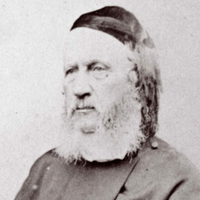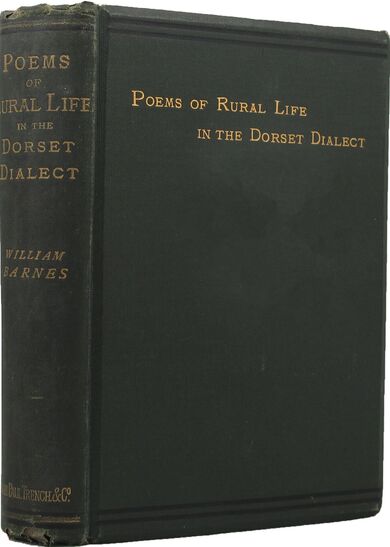When, leaete o’ nights, above the green
By thik wold house, the moon do sheen,
A leaedy there, a-hangen low
Her head, 's a-walken to an’ fro
In robes so white’s the driven snow,
Wi’ woone eaerm down, while woone do rest
All lily-white athirt the breast
O’ thik poor weepen leaedy.
The whirlen wind an’ whis’len squall
Do sheaeke the ivy by the wall,
An’ meaeke the plyen tree-tops rock,
But never ruffle her white frock;
An’ slammen door an’ rattlen lock,
That in thik empty house do sound,
Do never seem to meaeke look round
Thik ever downcast leaedy.
A leaedy, as the teaele do goo,
That woonce liv’d there, an’ lov’d too true,
Wer by a young man cast azide.
A mother sad, but not a bride;
An’ then her father, in his pride
An’ anger, offer’d woone o’ two
Vull bitter things to undergoo
To thik poor weepen leaedy:
That she herzelf should leaeve his door,
To darken it ageaen noo mwore;
Or that her little playsome chile,
A-zent away a thousand mile,
Should never meet her eyes to smile
An’ play ageaen; till she, in sheaeme,
Should die an’ leaeve a tarnish’d neaeme,
A sad vorseaeken leaedy.
“Let me be lost,” she cried, “the while
I do but know vor my poor chile;”
An’ left the hwome ov all her pride,
To wander drough the worold wide,
Wi’ grief that vew but she ha’ tried:
An’ lik’ a flow’r a blow ha’ broke,
She wither’d wi’ the deadly stroke,
An’ died a weepen leaedy.
An’ she do keep a-comen on
To zee her father dead an’ gone,
As if her soul could have noo rest
Avore her teaery cheaek’s a-prest
By his vorgiven kiss. Zoo blest
Be they that can but live in love,
An’ vind a pleaece o’ rest above
Unlik’ the weepen leaedy.


